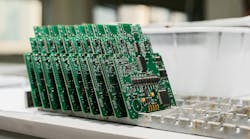Dialog Semiconductor is buying Silego Technology – whose one-time programmable chips can replace standard mixed-signal products in connected cars, industrial sensors, and other Internet of Things devices – for $276 million in cash.
Silego sells configurable mixed-signal chips that it claims can be programmed in minutes to help minimize component count, board space, and power consumption. According to the Santa Clara, California-based firm, these parts can integrate analog, power, and other discrete components into a single device.
“The acquisition of Silego brings a highly complementary technology,” said Jalal Bagherli, Dialog’s chief executive, in a statement. Dialog sells power management, charging, and connectivity chips for a wide assortment of gadgets, but it reaps most of its revenue from smartphones sold by makers Apple and Samsung. It has been trying to change that.
Last year, it agreed to pay $4.6 billion for Atmel, which sells microcontrollers for industrial sensors and household devices like refrigerators and televisions. The deal fell apart after Atmel accepted an offer of $3.6 billion from Microchip Technology, arguing that investors would get more cash per share and that Microchip’s stock had better prospects.
The Silego acquisition is a smaller bet on grittier technology. Dialog, which is based in the U.K., said that it will benefit from sharing manufacturing, sales, and distribution operations with its new business. The deal is expected to close in the fourth quarter of this year, and Dialog will pay another $30.4 million if Silego hits revenue targets over the next 15 months.
“What Silego has developed is truly unique – a mixed-signal platform which customers can configure to their design requirements on the fly, drastically reducing the time to bring their products to market,” Bagherli said. “Together, we will significantly increase the value we can bring to our customers.”
Silego has sold around 3.1 billion mixed-signal configurable chips – also called CMICs – since it was founded in 2001. The company, which is privately-held and employs around 235 people worldwide, said that it expects to generate over $80 million of revenue in 2017, with double-digit percent growth next year.

